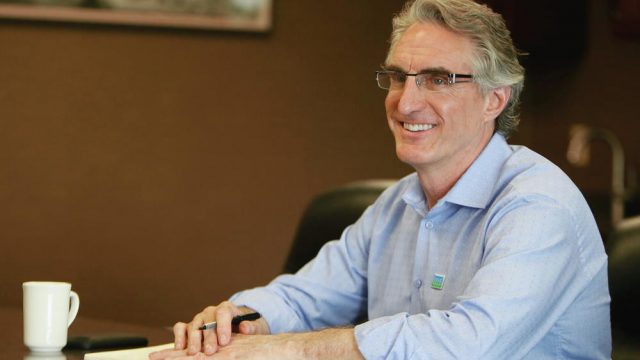Governor Burgum: Everyone Wants Lower Taxes “as Long as It Doesn’t Mean Cuts in Government Jobs in Their Location”

Doug Burgum gets a briefing on the Cardinal IG plant Friday, May 27, 2016, in Fargo. Michael Vosburg / Forum Photo Editor
I had Governor Doug Burgum on my radio show on Friday and we talked about property taxes and the push for health policy reform in Washington D.C. (more on those things in a moment), but the most interesting things he had to say were about higher education I think.
I flagged some of Burgum’s comments to the editorial boards of the Fargo Forum and Grand Forks Herald earlier this week where he talked about universities being operated as “jobs programs” and said North Dakotans “cling” too tightly to “the idea of location.”
Our state has many state institutions, including most of the state’s 11 public campuses, entrenched in the state constitution. Many, including this observer, see that entrenchment as a serious impediment to sound policy and the efficient delivery of government services.
Burgum, apparently, agrees. To a degree (he isn’t saying he wants to close any institutions down, yet).
I asked him to expand on his remarks to the editorial boards during our interview. “Everybody wants lower taxes and more efficient government as long as it doesn’t mean cuts in government jobs in their location,” he told me, adding that this isn’t just a debate to be had about higher education.
[mks_pullquote align=”right” width=”300″ size=”24″ bg_color=”#ffffff” txt_color=”#000000″]”The constitution doesn’t insulate us from the reality that location matters less,” he added, referring to increasingly availability of free or deeply discounted skill-specific education available online or through courses which are very different from the traditional university offering.[/mks_pullquote]
He referenced the brawl over the Department of Transportation budget during the recent legislative session. He said the “number one thing” during the debate on that bill “was a discussion on closing down six places around the state where we’re going to store snowplows.”
But coming back to the issue of higher education, Burgum told me that the politics of parochialism matter very little to the realities of a changing higher education market. “With higher education we have to be competitive,” he said.
“The constitution doesn’t insulate us from the reality that location matters less,” he added, referring to increasingly availability of free or deeply discounted skill-specific education available online or through courses which are very different from the traditional university offering.
Interestingly, University of North Dakota President Mark Kennedy made a very similar point during an unveiling of the strategic plan for his campus, referencing “disruptive change” in the higher education industry. “One threat identified by Kennedy is free educational content offered online through companies like edX and Khan Academy, the former of which offers courses broadcast from elite institutions and distributes certificates of completion to those who finish the class,” my colleague Andrew Haffner reports. “Kennedy also identified as threats changes in the concept of a degree itself—pointing out ‘nanodegree’ options which provide specific, marketable skills and are welcomed by employers—and the increasing presence of traditional universities expanding their footprint in the digital realm.”
Both Kennedy and Burgum have the right outlook, I think. Big changes are coming for higher education. Campuses are going to close. No longer can North Dakota afford to cling a 19th century constitutional mandate for campuses sprinkled across the state.
I also asked Burgum about the health care bill the House passed this week. “I’m not sure if that’s going to get through the U.S. Senate,” Burgum said. He also said that the legislation being debated in Congress is about health insurance, and he wants to see more focus on the costs of health care. He said Congress is spending “a lot of time talking about subsidies for insurance” adding that “doctors see fewer patients not more” because of various mandates put in place by the federal government.
On property taxes, he said going forward North Dakotans need to look to their local officials to address any increases. “I do believe property taxes are a local issue,” he said, adding that the “state got into the business of subsidizing local spending.”
It’s local decisions “that are driving up property taxes,” he said, adding that the state in the coming biennium is budgeted to spend $50 million more on education and other types of local spending than it did in the current biennium.
Here’s the full audio of our discussion:
[fcc_jw_podcast key=”kapgADAl” player-image=”139345″]




